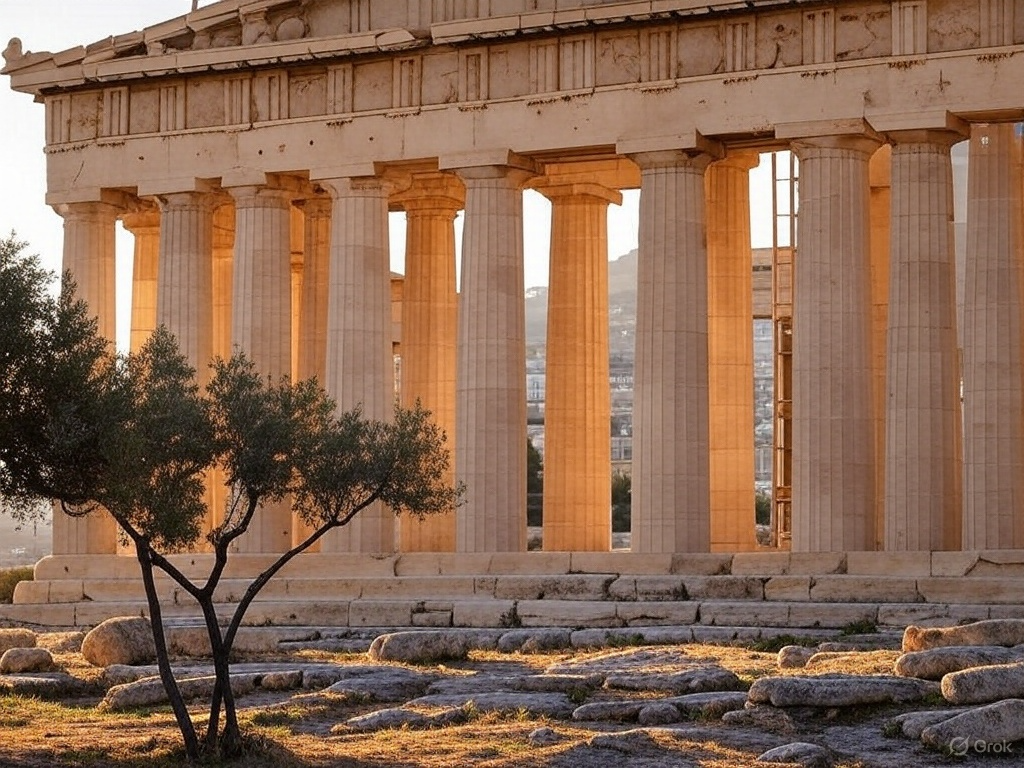From the Olympic Games to architecture, philosophy, art & literature, Ancient Greece shaped the world we live in.
Ancient Greece civilization dominated much of the Mediterranean Sea for more than 3000 years. Though the Greeks lived in different city-states, they shared the same ideologies, culture, language, and religious beliefs.
Beginning in the Bronze Age, the Cycladic civilization flourished in farming and trades of metals across the sea, and businesses were booming.
Later, the Minoans were known to be the early settlers living on the Islands of Crete between 2200 BC and 1500 BC.
The Mycenaean civilization followed later. They lived on the mainlands of Greece and produced skilled workers, builders, and some of the finest soldiers. This period has come to be known by the Greeks as “the age of heroes''. It is also during this age when the great writer Homer wrote stories and published books, such as Iliad and the Odyssey, on the Mycenaean period, paving the way for Greek mythology and literature to flourish.
Greece entered the Dark Age after the fall of the Mycenaean civilization. Many palaces and homes were either destroyed or abandoned. During this time, the people dispersed and formed small villages across the Greek empire. 300 years later, around 800 BCE, the Greek civilization re-emerged slowly which ushered the Archaic period.
Archaic Period
The small villages that were scattered across Greece began to evolve. They established governments of their own. Set up their own constitution and laws and built strong armies. They advanced in the field of education, technology, arts, literature, architecture, and philosophy.
As the villages flourished, they soon came to be known as city-states or polis. Each of these polis was independent, which started a surge of rivalries among themselves, especially between Athens and Sparta. The noble blood was separated from the common people which created conflicts within their own city-state.
Greek artwork became popular. A variety of sculptures, Ancient Greek paintings, painted pottery, and even architecture was on the rise. One such famous architectural building is the Parthenon, which is a temple dedicated to the goddess Athena whom the people of Athens considered a benefactress. Much of these arts were lost during the Dark Ages, but they still brought about a monumental change to the development of Ancient Greece.
Classical Period
For almost 200 years, the Greeks were the first who developed democracy, “rule by the people”, which had a profound influence on today’s democratic culture.
This period is also known as the golden age. Drama, theater, philosophy, and literature thrived, particularly in mainland Greece and Athens.
During this time, Alexander the Great became the only Greek to unite all the city-states and create one of the largest empires in history. He succeeded his father as the King of Macedonia and is ranked as one of the most influential people in human history. During his reign, Greek culture spread fast and wide as far as modern-day Afghanistan, Pakistan, and Egypt.
Hellenistic Period
It was the end of an era when the death of Alexander the Great brought about divisions of the city-states he worked so hard to unite. By the time his empire fell, Greek culture had reached across the Middle East. This period came to an end when the Romans annexed Greece, however, the ideologies, art, and culture remained and were greatly influenced by the Roman Empire.
All these eras left behind memoirs of Greek traditions, art, and culture that shaped and influenced much of our modern-world today. The Olympic Games is one such example that began in the city-state of Olympia and continued on for thousands of years till date.
Some Interesting Facts About Ancient Greece
● Athens and Sparta were two of the 100 city-states that dominated all other regions. They were sworn rivals but united against invaders. Even their cultures were different. Athenians were more focused on education and arts whereas Spartans concentrated more on war and weaponry.
● As villages turned to city-states, the people were divided based on status. Approximately one-third of the population in all city-states were unpaid slaves.
● After the Romans took over Greece, they followed Greek culture and traditions. They even worshiped Greek Gods, copied their language and even their eating style.
● The Greeks ate food while lying on their sides and the Romans followed suit.
● When there is a trial going on, Greeks used juries of about 500 citizens but nowadays, we use only 12.
● The Greeks worshiped many Gods and Goddesses and even built temples, like the Parthenon, dedicating it to them.
● In Greek Language, Greece is known as “Hellas”. They called themselves “Hellenes”.
● Apart from dolls, the yo-yo is the second-oldest toy in the world invented by the Greeks.
During the 5th century BCE, many new things started to emerge. Persians tried to attack and take over Greece many times, but failed unsuccessfully. If not the Persian invaders, it was a war between Athens and Sparta that led to the Peloponnesian War where Sparta became victorious.
However, even though the Athene's lost the war, they prospered in arts, mathematics, science, and especially philosophy. They gave birth to the three most famous Greek philosophers: Socrates, Plato, and Aristotle.
Have you ever wondered where most of the mathematical concepts came from? Pythagoras’ Theorem, geometry, and even some astronomical models were developed by the Ancient Greeks. The heliocentric model of the Solar system, which discovered that the sun is at the center of the system, is one such example.
Hippocrates, another Ancient Greek, was a famous physician. He not only established a medical school but also contributed to investigate diseases and systemically prepared remedies. Because of his contribution to medicine, he is given the title of the founder of modern medicine. A medical standard for doctors known as the Hippocratic Oath has been named after him.
Final Thoughts
Ancient Greece is one of the oldest and brilliant civilizations to have existed. Their contributions in the field of science, mathematics, arts, language, philosophy, and many more have influenced and inspired our modern world. Even the Romans, who conquered Greece in 146 BC, embraced Greek culture and followed in their footsteps.









